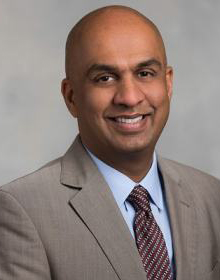Listen Now
Topics Covered
- Overview of Common Eye & Vision Changes Related to Cancer Treatments
- Discussion of Common Eye & Vision Changes, Including Causes & Risk Factors
- Tips to Manage Dry Eyes, Watery Eyes, Itching Eyes, Blepharitis, Loss of Eyelashes, Changes in Vision, Cataracts, Floaters, & Flashing Lights
- The Role of the Multidisciplinary Team
- Tips to Manage Low Vision & How Eye Products Can Help You Manage Eye/Vision Changes
- Clinical Trials & Communicating with Your Health Care Team
- Guidelines for Eye Examinations & Check-Ups
- Quality-of-Life Concerns
- Questions for Our Panel of Experts
Our Panel of Experts

Brian P. Marr, MD
John Wilson Espy, MD Professor of Ophthalmology, Columbia University Medical Center, NewYork-Presbyterian / Columbia University Irving Medical Center

Prithvi Mruthyunjaya, MD, MHS
Professor of Ophthalmology, Associate Professor of Radiation Oncology, Ocular Oncology and Vitreoretinal Surgery, Director, Ocular Oncology Service, Director, Vitreoretinal Surgery Fellowship, Byers Eye Institute at Stanford University

Michael K. Wong, MD, PhD, FRCPC
Professor, Medical Oncology, Melanoma and Cutaneous Malignancies, Executive Director, Integration and Program Development, Division of MD Anderson Cancer Network, The University of Texas MD Anderson Cancer Center

Stewart B. Fleishman, MD
Former Founding Director, Cancer Support Services, Continuum Cancer Centers of New York, formally part of the Mt. Sinai Health System, Author, Researcher in Oncology

Marissa Fors, MSW
Director of Specialized Programs, CancerCare
Brochure
You can download the brochure for this workshop
Workshop Date
This workshop was originally recorded on April 08, 2024.

